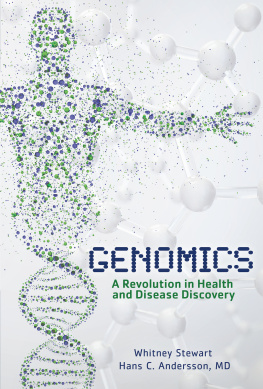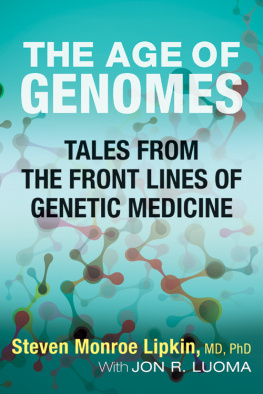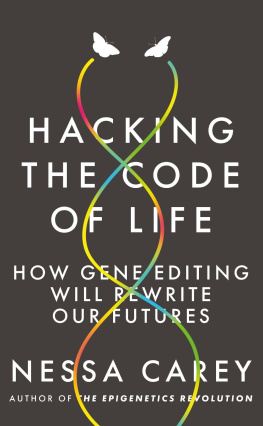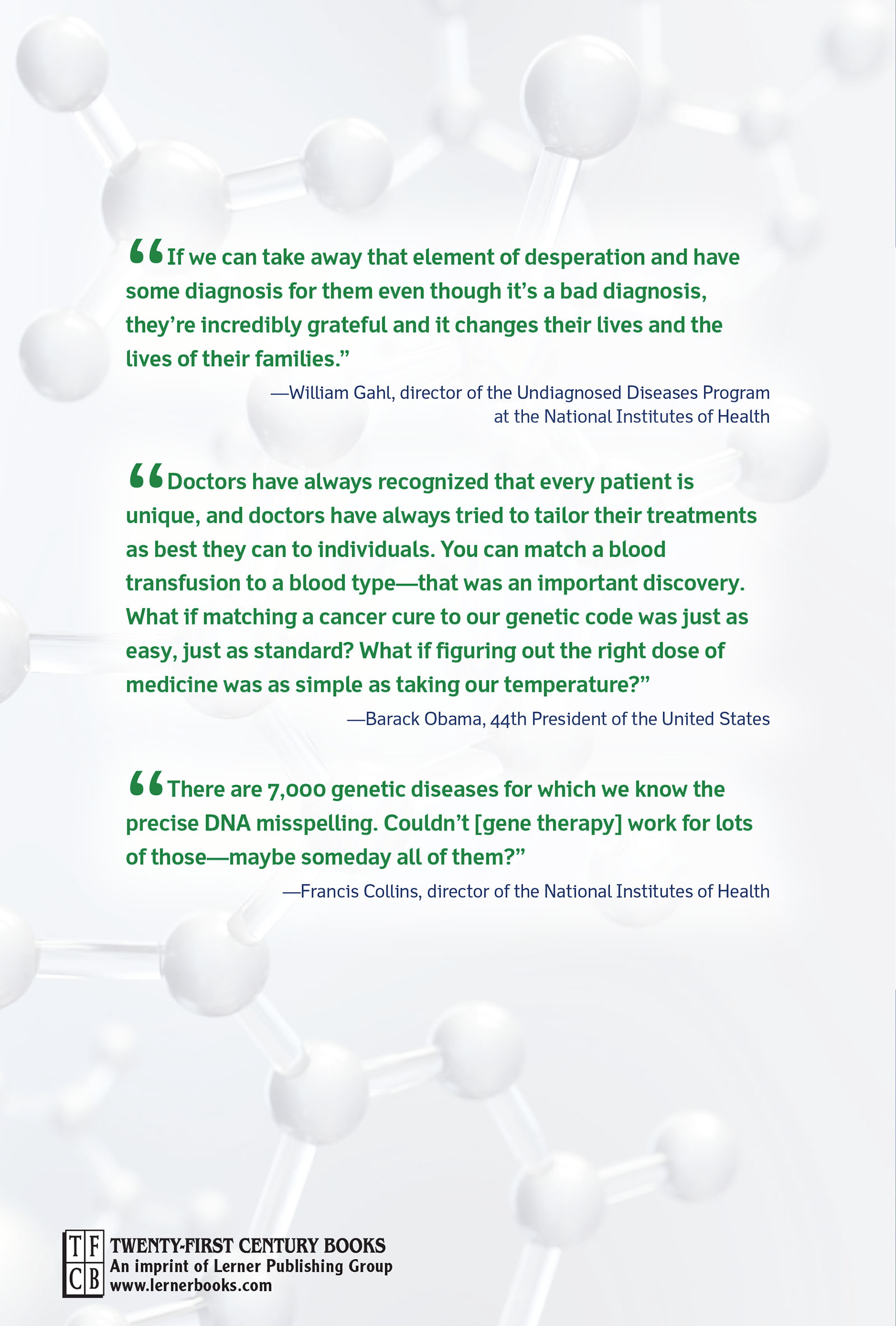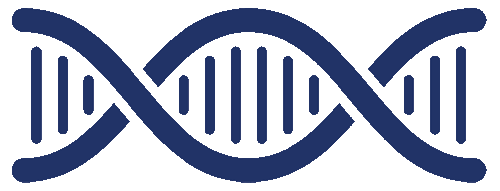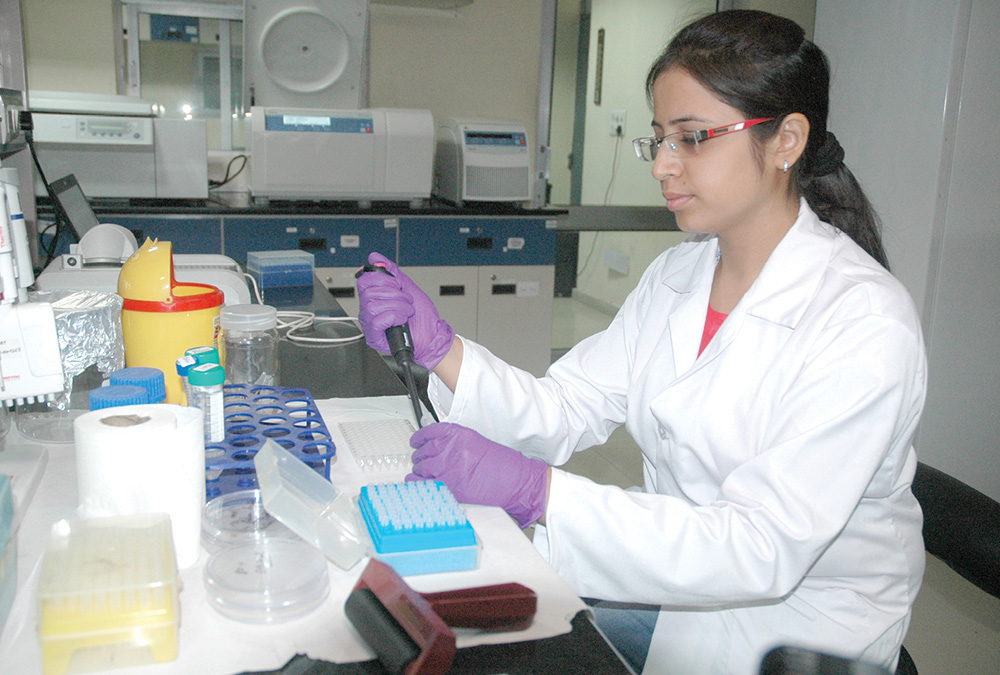We dedicate this book to patients with inherited disorders whose diagnostic odyssey is years long and often ends in unsatisfactory treatments. We also hope our book will inspire young readers to train in the field of genetic science and medicine where they can dedicate their life to unraveling the mysteries of the genome.
Acknowledgments: The authors would like to thank William Gahl, clinical director of the National Human Genome Research Institute and director of the Undiagnosed Diseases Program, for his time and expertise. We also thank Anne Sophia Everett for reading an early draft and offering feedback. We are grateful to the patients and their family members who generously took time to answer our questions. We have changed their names to protect privacy.
Text copyright 2021 by Whitney Stewart and Hans C. Andersson, MD
All rights reserved. International copyright secured. No part of this book may be reproduced, stored in a retrieval system, or transmitted in any form or by any meanselectronic, mechanical, photocopying, recording, or otherwisewithout the prior written permission of Lerner Publishing Group, Inc., except for the inclusion of brief quotations in an acknowledged review .
Twenty-First Century Books
An imprint of Lerner Publishing Group, Inc.
241 First Avenue North
Minneapolis, MN 55401 USA
For reading levels and more information, look up this title at www.lernerbooks.com .
Main body text set in Metro Office.
Typeface provided by Linotype AG.
Library of Congress Cataloging-in-Publication Data
Names: Stewart, Whitney, 1959 author . | Andersson, Hans Christoph, 1956 author.
Title: Genomic s : a revolution in health and disease discovery / Whitney Stewart and Hans Andersson, MD.
Description: Minneapoli s : Twenty-First Century Books, [2021 ] | Includes bibliographical references and index . | Audience: Ages 131 8 | Audience: Grades 101 2 | Summary: Since the completion of the Human Genome Project, genetic studies has transitioned into an era of discovery. This book explores the breakthroughs in research that inform our understanding of ancestry, inheritance, epigenetics, health, and medicine. Provided by publisher.
Identifiers: LCCN 2019041514 (print ) | LCCN 2019041515 (ebook ) | ISBN 781541500563 (library binding ) | ISBN 781728401560 (ebook)
Subjects: LCSH: Genomics.
Classification: LCC QH447 .S74 2021 (print ) | LCC QH447 (ebook ) | DDC 572.8/6dc23
LC record available at https://lccn.loc.gov/2019041514
LC ebook record available at https://lccn.loc.gov/2019041515
Manufactured in the United States of America
1-43699-33491-2/4/2020
Contents
Introduction
Roy remembers being a healthy child despite suffering from a sinus infection about once a year. Back then Roy had more important things to think about than head congestion and a runny nose. He was a talented trumpet player and started playing in nightclubs at the age of fourteen. Later, though, he began to have more frequent sinus infections and often felt tired. He thought his health problems came from performing at night in a smoke-filled room and from not getting enough sleep.
Roys fatigue grew worse, so he went to the doctor. He was diagnosed with iron-deficiency anemia, or a low red blood cell count, which can make people tired, lightheaded, and weak. Treatment for iron-deficiency anemia usually involves taking iron supplements and eating a diet rich in iron and vitamins needed to make red blood cells. Roy was under medical care, but his anemia persisted. He still felt weak and continued to have sinus infections. When he was twenty, Roy had sinus surgery, but that didnt cure his infections. After college, despite having health issues, Roy toured as a musician, taught music classes, and gave trumpet lessons on the side. His schedule was demanding, so it was hard to tell if his fatigue came from his busy lifestyle, anemia, infections, or from something else.
Roy went to graduate school to earn his doctorate degree in music. In his late twenties he started to feel more extreme fatigue. He couldnt understand it because he was getting more sleep than he had when he was a touring musician. He also had regular stomach upset and chronic diarrhea. His lymph nodes became swollen, which is a sign of inflammation in the body. Roy went to a gastroenterologist because of his intestinal trouble, and this time, he was diagnosed with celiac disease, an autoimmune disorder. In patients with autoimmune disorders, the immune system mistakenly attacks healthy cells in the body. When people with celiac disease eat glutena protein in wheat, rye, and barleytheir body triggers an immune response that damages the small intestine. Without treatment, a person with celiac disease can develop such serious health problems as type 1 diabetes, multiple sclerosis, and intestinal cancer. People with celiac must avoid eating gluten found in such common foods as traditional spaghetti, ramen, pizza, batter-fried chicken, bread, pancakes, cereal, crackers, and even soy sauce.
What did this mean for Roy? He had to change his diet. I hoped that going gluten-free would be easy, and Id be fine. But his new diet didnt help. He still had chronic diarrhea and was using the restroom about a dozen times a day. And his lymph nodes continued to swell, sometimes to the size of a golf ball. Roys doctors removed and tested his lymph nodes, but the pathology tests came back negative for obvious causes. They could not figure out what was making Roy so sick.
By the time Roy was in his early thirties, he had seen so many medical specialists he couldnt count them allgastroenterologists, dermatologists, immunologists, and hematologists. Sometimes he could barely drag himself out of bed. I felt useless, he said.
Something was causing all of Roys symptoms, but none of his doctors knew how to identify it. Other members of Roys family had autoimmune disorders: type 1 diabetes, which affects blood sugar levels, and Crohns disease, which causes inflammation in the intestinal track. Roys mother died when she was only forty-three after having suffered from a persistent and undiagnosed intestinal problem. Could it be that Roy and his family members suffered from an undiagnosed genetic disorder that was passed down through generations?
When Roy was born, doctors did not have nearly as many genetic tools to diagnose and treat disease. Scientists had discovered the structure of DNA but were only just beginning to identify specific genes that cause disease. In the past forty years, so much progress has been made in genetics that doctors have encountered a different problem: keeping up with the latest discoveries in the field and using new information in patient care. New diagnostic and therapeutic tools are prompting a reevaluation of all diseases. Specialists in every field are asking themselves how genetic sequencing and gene therapy can help them to understand and treat their patients.
Genetic researchers use a slew of tools to assist with their experiments, including test tubes, pipettes, and microscopes. Many of the tools are the same ones used in high school chemistry classes.

